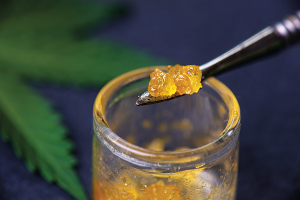Cannabis concentrates a growing market that needs propane professionals

Propane and butane can be used to extract cannabis oil from the plant. Photo: rgbspace/iStock / Getty Images Plus/Getty Images
In June 2018, an employee of Future2 Labs Health Services, located in California, was working alone in a 128-sq.-ft. portable storage container extracting oil from cannabis leaves with propane when a spark caused an explosion, burning the worker and hospitalizing him.
“The process of using a highly flammable gas to extract oil from cannabis leaves is dangerous,” says Cal/OSHA chief Juliann Sum. “To prevent injuries and mitigate risk, employers in the cannabis industry must establish and implement an effective injury and illness prevention program, provide effective training to their employees and comply with safety and health standards.”
Twenty-three states have legalized marijuana use for recreational and/or medical purposes. The demand and technology for even more potent forms of cannabis are surging. Enter cannabis concentrates such as wax, budder, sugar, shatter and oil.
Propane professionals are uniquely qualified to educate the cannabis industry on how to use propane safely during the extraction process. Such a partnership would allow the propane industry to take advantage of an expanding market opportunity.
Extraction process
Nontoxic solvents such as propane, butane and carbon dioxide are often the preferred choices to coax the cannabis oil from the plant.
In addition to nontoxicity, propane has a lower boiling point than butane, which allows for a lower purging temperature – another safety and marketing bonus for propane.
Extraction hazards
Propane and butane present potential fire and explosion hazards when used during the extraction process, and many extraction operators may not be aware of safe propane-handling procedures.
As propane professionals, you know how to handle propane safely. You are in the position of providing added value by educating members of the cannabis extraction industry about cylinder safety, including cylinder connections, static electricity, transportation, storage and dispensing, separation distances, equipment/valve modifications, hazard communication, personal protective equipment requirements and emergency response plans.
Codes and state laws
As the demand for cannabis concentrates grows, so too will the need to produce concentrates safely.
NFPA 58 includes many requirements that apply to the cannabis extraction process that many such facilities may lack. As you read the few listed below – there are more – ask yourself how you could provide safety value to your cannabis customers that would separate you from the competition.
The cannabis extraction process requires propane purity. NFPA 58 requires propane to be odorized as a warning agent in the event of a leak. However, the odorant used in propane is detrimental to the cannabis extraction process, requiring non-odorized propane. Thus, emergency action plans must be tailored to this and other unique situations that are part of the extraction process.
NFPA 58 covers liquid transfer, including the suitability, evacuation and filling of containers, training and emergency response. I suspect that many extraction facility employees lack education about container certification or pre-fill inspection practices.
Extraction facilities may not be wired to meet the Class 1, Division 1 requirements for sources of ignition. Some of the equipment may not be approved for use in that type of location, and employees may have little to no knowledge on how to safely transfer or dispense liquid propane.
As propane professionals, you have the specialized knowledge about propane safety that reduces incidents, retains customers and obtains new ones, even in industries you may have never considered.
Stuart Flatow spent 18 years as the Propane Education & Research Council’s vice president for safety and training before stepping down in February 2019. He can be reached by emailing sflatow@aol.com.
NOTE: The opinions and viewpoints expressed herein are solely the author’s and should in no way be interpreted as those of LP Gas magazine or any of its staff members.
















